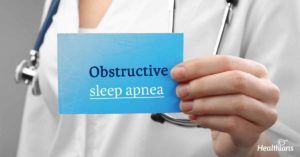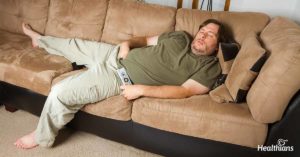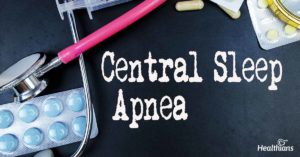Contributed by – Healthians Team
Having a disturbed sleep or waking up tired after a full night sleep or suddenly woken up by your partner in the middle of the night cause of your irregular breathing, you might be suffering from sleep apnea! If you are facing any of these situations, then it’s time to enlighten yourself regarding your problem and make a trip to your doctor.
Sleep Apnea is supposedly a serious sleep disorder with an irregular breathing pattern, that is the breathing stops and starts again There are cases in which the pause in the breathing could last for 10 secs or more, occurring almost 30 times in a span of one hr. That means during this time frame the brain and rest of the body are not be getting enough of oxygen, leading to severe problems.

Symptoms of Sleep Apnea
Many people suffer from Sleep Apnea, and they are entirely unaware of their situation. The most common symptom of Sleep Apnea is snoring, but not everyone who snores has Apnea. There are some common sign and symptoms for this tacit problem, these include:
-
- Daytime sleep or fatigue
- Sleepiness while driving
- Waking with a sore or a dry throat
- Silent pauses in breathing
- Choking or gasping sound
- Insomnia or recurrent awakening
- Weight gains
- Morning headaches
- Nocturia that is waking in the night to make bathroom trips
- Finding it difficult to concentrate
- Loss of memory
- Decreased sexual desire
- Feeling irritable most of the time
If experiencing any of these symptoms, it’s time to get yourself examined for sleep apnea.
Causes of Sleep Apnea
Three types of Sleep Apnea are there that can cause blocking or collapse of the airways. These include:

Obstructive Sleep Apnea (OSA)
OSA is the most common types of Sleep Apnea, and it occurs when the air is not able to reach the lungs because of collapse in the upper airways. It is because of the over-relaxation of the throat muscles, which then affects the normal breathing.
Reason: When the muscles are in a relaxed phase, the airways narrow or close as a person breathes in and this can cause inadequate breathing for about 10 to 20 sec. It might lead to a buildup of carbon monoxide, by lowering the oxygen levels. People suffering from OSA may not be aware of their interrupted sleep, and they feel that they slept well.
OSA occurs in three phases
Phase 1: Airway is partly blocked, leading to loud snoring
Phase 2: Airway collapses and the airflow through it stops entirely, or significantly diminishes for at least 10 seconds and can go up to 2 minutes.
Phase 3: In this phase, the individual mostly wakes up and often snorts or gasps for air. Once the breath is gasped, the person returns to his sleep, and the cycles get repeated.
Common Causes
In adults these are:
- Excessive weight
- Obesity
- Hypertension
- Diabetes
- Men are more likely to be impacted by OSA
- Smokers
- Diabetes
- Heredity
- Asthma
In children:
- Enlarged tonsils
- Certain dental conditions like overbite
- Some less common conditions are there like, tumor or growth in the airways, congenital disabilities, childhood obesity
Central Sleep Apnea
It is a rare condition. In this, the breathing gets disrupted during the sleep cycle due to a problem in the brain or heart.
Reason: In central sleep apnea the brainisunable to send proper signals to the muscles that have been controlling the breathing cycle. In this condition, the person will not try to breathe as the brain is not giving the desired signals.
Causes
It is common in adults and is mostly associated with severe illness, that includes
-
- Congestive heart failure
- Hypothyroid disease
- Kidney failure
- A specific neurological disease like Parkinson’s disease, Alzheimer’s disease, amyotrophic lateral sclerosis
- Any damage to the brain stem, like in cases of encephalitis, stroke, injury or other factors
- Due to a drug or substance use

Mixed Sleep Apnea
Mixed sleep apnea includes both central sleep apnea and obstructive sleep apnea, starting from central sleep apnea.
Diagnosis
Sleep apnea is diagnosed based on the signs and symptoms and sleep history provided by the patient. Some of the standard test advised for the diagnosis includes:
- Nocturnal polysomnography
- Home sleep test
Treatment
Treatment of sleep apnea will depend on its type and stage.
In mild cases:
-
- Lifestyle changes can help like weight loss or cigarette cessation.
- When it is due to nasal allergy, then taking anti-allergic on the recommendation of the doctors can help.
In severe cases:
If these measures are not able to provide any relief, then other treatment options are available:
- Certain devices can assist in opening blocked airways
- Surgery, in certain cases
- Therapies: Certain therapies can help, these are
- Continuous positive airway pressure
- Another airway pressure device
- Oral appliances
Your doctor will be able to guide regarding the most suitable option for you!

Risk Factors
Risk factors that are common for sleep apnea include:
- Obesity
- Chronic sinusitis
- Large neck circumference
- Any recent weight gains
- Sleeping in the supine position
- Large tonsils or adenoids
- Smoking
- Suffering from Down syndrome
- Family history
- Having a recessed chin or large overbite
A proper diagnosis and timely treatment of sleep apnea can help in improving the quality of sleep and life!





